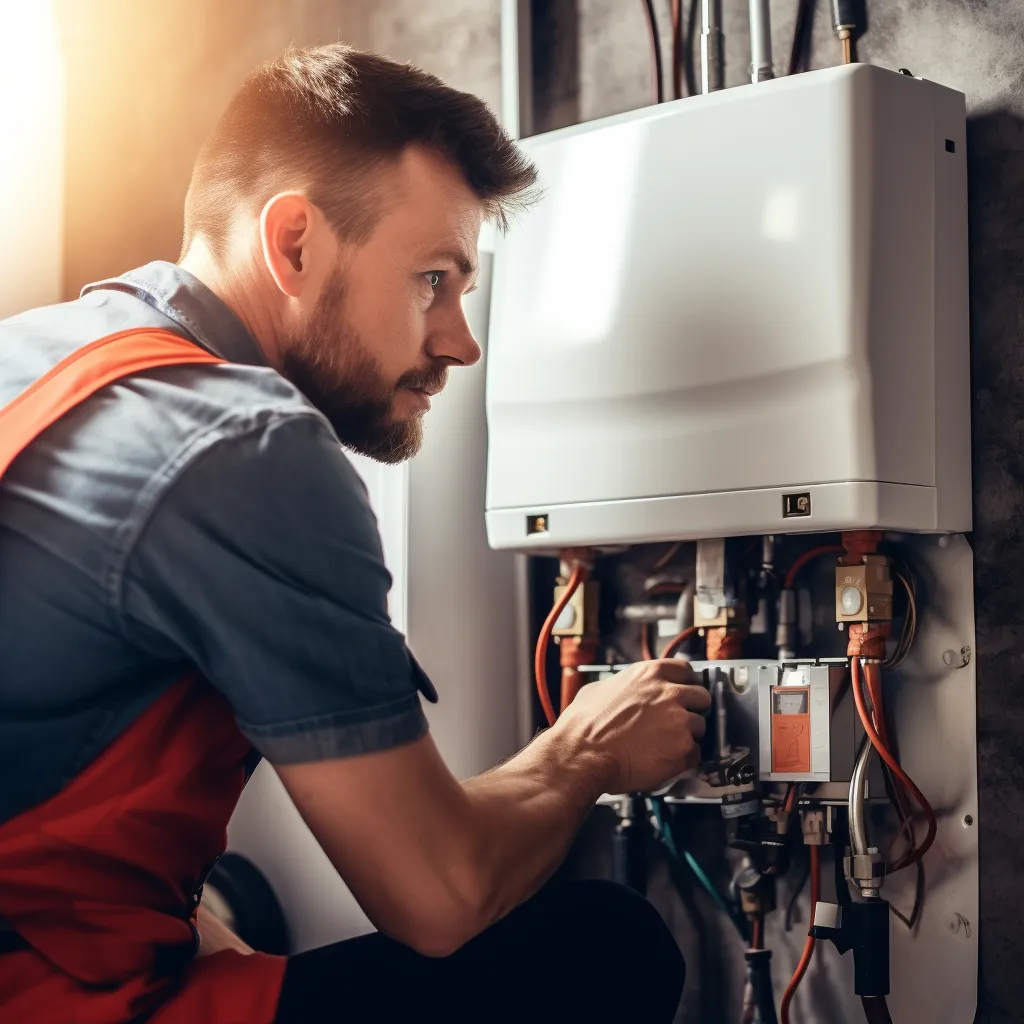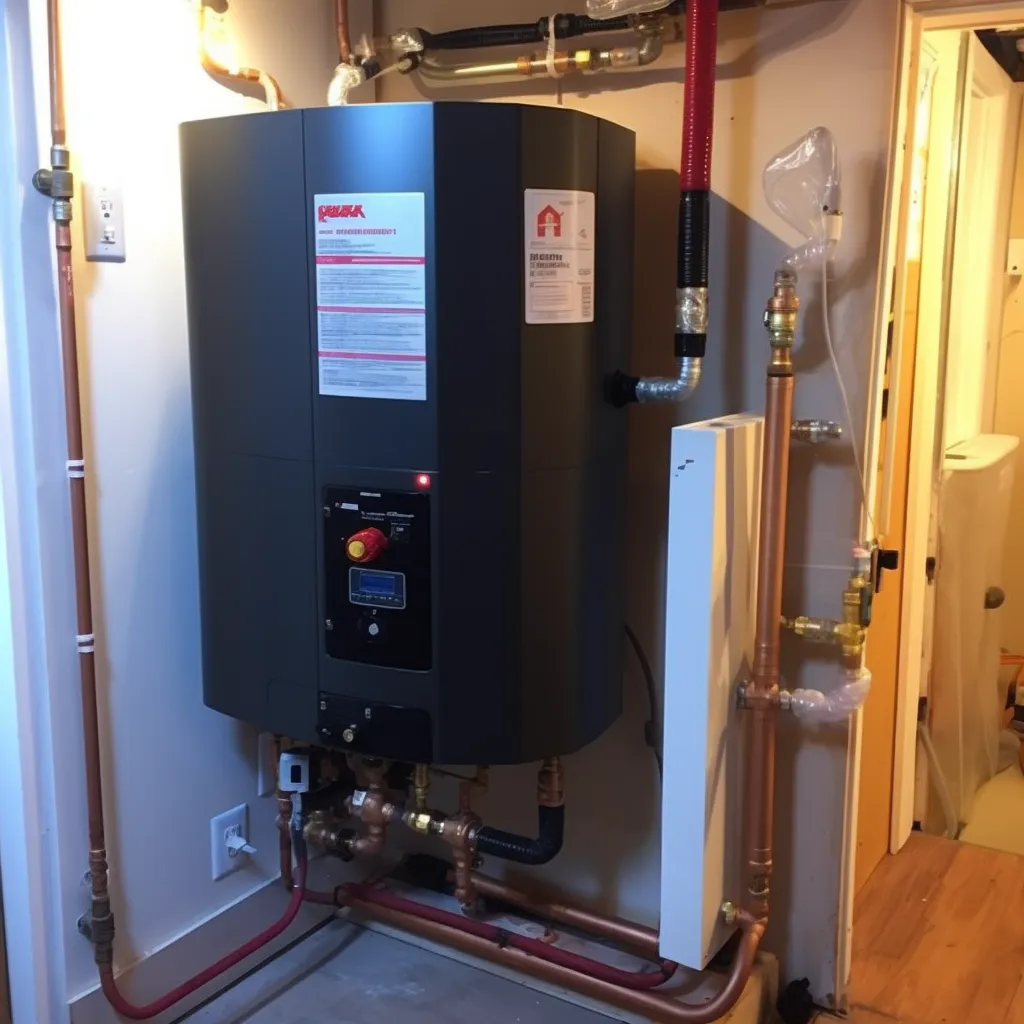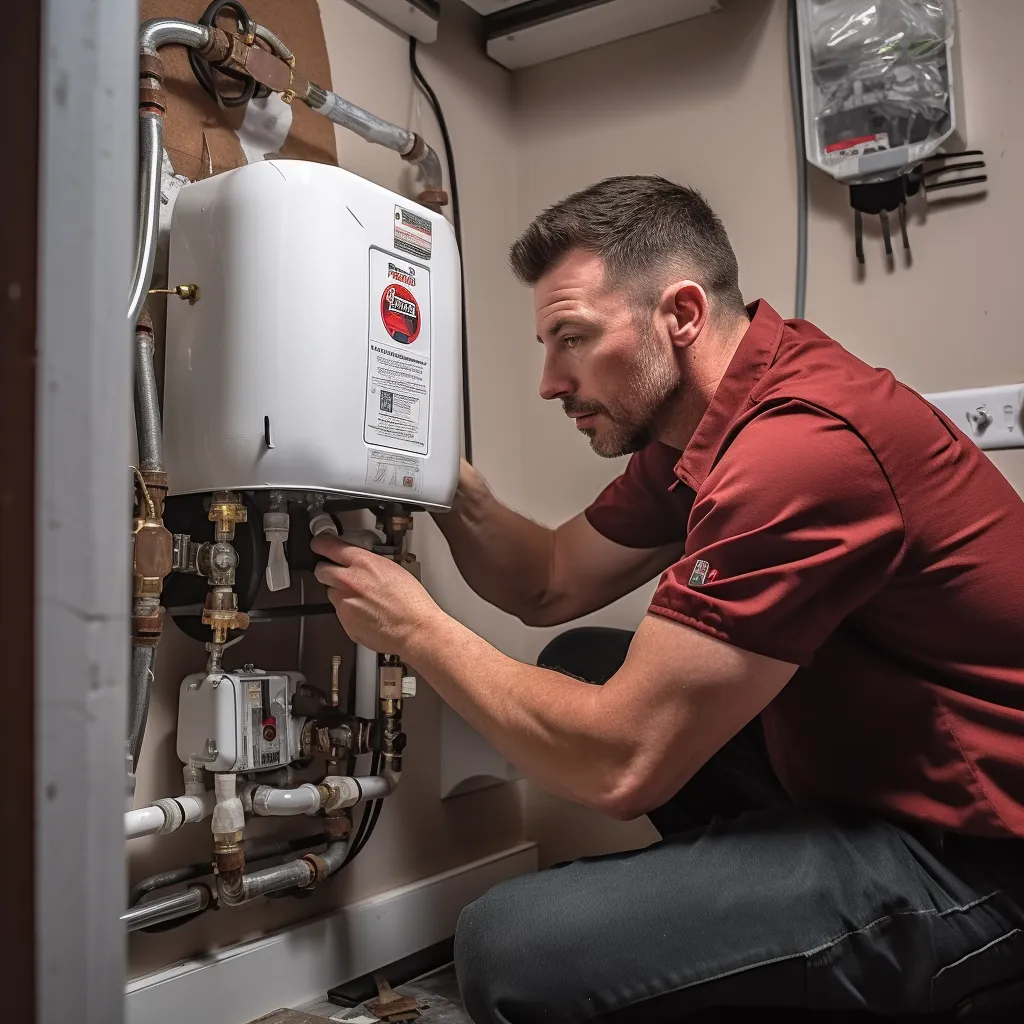Gas vs Electric Water Heater: Ultimate Comparison
When considering the choice between a gas or electric water heater, it's crucial to understand the significant differences between these options. This article offers an in-depth analysis of the pros and cons associated with both gas and electric water heaters. By comparing factors such as energy efficiency and upfront costs, homeowners can make informed decisions that suit their specific needs.

How do electric water heaters work?
An electric water heater functions by employing submerged heating elements located inside a storage tank. These heating elements draw power from your home's electrical system. The unit's thermostat continuously monitors the water temperature and turns off the heating elements once the desired temperature is attained. This process ensures a constant supply of hot water for your household needs.

Benefits of electric water heaters
Electric water heaters offer a host of benefits over traditional gas-powered heaters:

Efficiency: Electric water heaters boast high energy efficiency as they convert almost all of the electricity into heat. This can lead to cost savings on energy bills over time, making them a practical choice for budget-conscious homeowners.
Lower upfront costs: Electric water heaters generally have lower upfront costs compared to gas-powered models. Additionally, their installation and maintenance costs tend to be more affordable, making them an attractive option for those seeking budget-friendly solutions.
Environmentally friendly: Electric water heaters operate without producing any greenhouse gas emissions during use, making them a more environmentally friendly choice and contributing to a greener home.
Durability: Electric water heaters often have a longer lifespan compared to gas-powered heaters, providing reliable hot water for an extended period, ensuring longevity and consistent performance.
Safety: Electric water heaters are considered safer since they eliminate the need for gas lines, reducing the risk of gas leaks and carbon monoxide poisoning, making them a reliable option for households.
Disadvantages of electric water heaters
Despite their many advantages, electric water heaters, like everything else, have some downsides.

Slower recovery rate: Electric water heaters typically have a slower rate of water heating compared to gas models. This means it may take longer for the water to reach the desired temperature, especially during periods of high demand, which could be a consideration for households with larger hot water needs.
Energy costs: While electric water heaters are more energy-efficient, electricity rates can still lead to higher energy bills compared to natural gas. It's important to factor in the ongoing costs of electricity when considering the overall expense of operating an electric water heater.
Shorter lifespan: Electric water heaters generally have a shorter lifespan compared to gas-powered models. This means you may need to replace the unit sooner, potentially adding to long-term costs and requiring more frequent replacements.
Power outage impact: Electric water heaters rely on a continuous supply of electricity to function. During power outages, there may be no hot water available until power is restored, which can be a significant inconvenience in certain situations. This aspect may be especially important to consider in areas prone to frequent power outages.


How do gas water heaters work?
Gas water heaters use a gas burner to heat the water in a large storage tank, and the heated water is then available for use through taps and fixtures in the home. The burner is controlled by a thermostat, which maintains the water at the desired temperature. As hot water is used, cold water enters the tank to replace it, and the burner continues to heat the incoming water, maintaining a constant supply of hot water. This process allows for on-demand access to hot water whenever needed. Gas water heaters are popular for their quick recovery times and ability to provide hot water even during power outages, making them a reliable choice for many households.
Pros of gas water heaters
Gas water heaters are a popular choice for many reasons:

Versatile operation: Gas water heaters can still function during power outages, ensuring continuous hot water supply even when the electricity is down.
High hot water output: Gas water heaters are capable of producing a higher volume of hot water, making them suitable for homes with higher hot water demands or multiple occupants.
Environmental impact: While gas water heaters produce greenhouse gas emissions during operation, newer models are designed to be more energy-efficient and eco-friendly, reducing their environmental impact.
Installation requirements: Gas water heaters typically require proper ventilation to release exhaust gases, which may affect the installation process and location options within the home.
Safety considerations: Due to the use of gas and open flames, gas water heaters require special safety measures to prevent gas leaks and ensure proper venting, making professional installation and regular maintenance crucial.

Cons of gas water heaters
Despite their many advantages, gas water heaters also have some potential downsides:

Carbon footprint: The combustion of natural gas in gas water heaters releases carbon dioxide and other greenhouse gases, contributing to climate change and environmental issues.
Availability of gas supply: Homes that do not have access to a natural gas supply may face challenges in using gas water heaters, making electric units a more feasible option.
Safety concerns: As gas water heaters involve open flames and combustible fuel, there is a potential risk of fire or gas leaks if not installed and maintained correctly. Ensuring proper ventilation and regular inspections are crucial for safe operation.
Noise level: Gas water heaters can be noisier during operation compared to electric units, which may be a consideration for noise-sensitive households.
Space requirements: Gas water heaters typically require more space for proper installation, including adequate clearance for venting and gas lines, which may limit their placement options in smaller or more confined areas.

Are electric water heaters energy-efficient?
Electric water heaters have improved their energy efficiency over time, narrowing the gap with gas-powered models. Factors like unit size, insulation quality, and operating temperature impact their efficiency. Both gas and electric water heaters continue to evolve, offering improved performance and environmental benefits.

Are gas water heaters energy-efficient?
Gas water heaters are known for their cost-effectiveness and higher energy efficiency compared to electric models. By burning natural gas, they consume less energy to heat water. Factors like unit size, model, and maintenance practices can affect their efficiency rating.
What does it cost to buy and install electric water heaters?
Electric water heaters come in various sizes and configurations, impacting their cost. On average, a 50-gallon electric water heater may range from $300 to $800. The installation cost is usually around $300 to $500, depending on the scope of work and necessary permits.


What does it cost to buy and install gas water heaters?
Gas water heaters come in various sizes, with prices ranging from $500 to $1,500, while high-end models can reach up to $3,000. Additional installation charges may vary based on location and plumbing needs.
While the initial cost may seem higher, gas water heaters offer long-term benefits and savings. They are more energy-efficient, leading to lower utility bills over time, and provide a reliable and continuous supply of hot water, making them ideal for households with high hot water demand.

Maintenance needs of electric water heaters
Regular maintenance is essential for electric water heaters to ensure reliable and safe operation. Checking the temperature and pressure relief valve regularly helps prevent overheating and potential explosions. Periodically flushing the tank, typically every six months to a year, removes sediment buildup for optimal efficiency. Inspecting the heating elements for damage or mineral buildup and replacing them as needed is crucial. Additionally, ensuring secure and undamaged electrical connections is essential for safe functioning. If uncertain about performing maintenance tasks, seeking the assistance of a licensed professional is recommended.

Maintenance needs of gas water heaters
Regular maintenance is crucial for gas water heaters to ensure their effective and safe operation. Tasks such as annual tank flushing, periodic inspection of the anode rod, monitoring the burner and pilot assembly for debris or damage, annual testing of the temperature and pressure relief valve, and checking for gas leaks are important. By performing these maintenance tasks, you can ensure the efficient and safe functioning of your gas water heater. If you have any uncertainties or concerns, consulting a licensed professional is recommended.


Safety considerations of electric water heaters
Safety should be a top priority when using an electric water heater to prevent potential hazards. The risk of electrocution can be minimized by ensuring the heater is properly grounded and regularly inspected for malfunctions. Additionally, placing the heater away from flammable materials helps prevent fire hazards. Following the manufacturer's instructions and having a licensed professional handle the installation can further enhance safety. By taking these precautions, you can ensure the safe and reliable operation of your electric water heater.

Safety considerations of gas water heaters
Safety is of utmost importance when using gas water heaters. To ensure a safe environment in your home, it is crucial to take certain precautions. Firstly, install a carbon monoxide detector near the water heater to detect any potential leaks. Regularly inspect and maintain the heater to prevent malfunctions and ensure its proper functioning. Additionally, keep the area around the water heater clear of flammable materials to minimize the risk of fire hazards. By following these safety measures, you can use your gas water heater with peace of mind.

How to choose between electric vs gas water heater
By considering these factors, you can make an informed decision about the most suitable type of water heater for your needs.
Home size and hot water usage: Assess your household's size and hot water needs to determine the appropriate capacity of the water heater.
Cost: Compare the initial purchase and installation costs of electric and gas water heaters. Gas heaters may have higher upfront expenses, but they can offer long-term cost savings due to their energy efficiency.
Efficiency: Gas water heaters are generally more energy-efficient and cost-effective to operate compared to electric models. Consider their energy efficiency ratings to gauge potential utility bill savings.
Maintenance: Keep in mind that electric water heaters require less maintenance, while gas heaters need regular inspections to ensure safety and prevent malfunctions.
Environmental impact: Electric water heaters produce fewer emissions and have a lower carbon footprint compared to gas water heaters, making them a more environmentally friendly option.
By considering factors such as home size, hot water usage, cost, efficiency, maintenance, and environmental impact, you can make an informed decision about the most suitable type of water heater for your needs. Take into account the capacity required for your household, compare the initial costs of electric and gas heaters, and evaluate their energy efficiency. Consider the maintenance demands of each type, with electric heaters generally requiring less upkeep. Additionally, take note of the environmental impact, as electric heaters have a lower carbon footprint. Ultimately, your choice will depend on personal preferences, budget, and specific considerations for your home and lifestyle. Weigh these factors carefully to ensure a reliable supply of hot water that aligns with your priorities.

Why you should hire a licensed professional
to install your water heater
When it comes to installing or replacing a water heater, it's crucial to prioritize safety and efficiency. While attempting a DIY approach might seem cost-effective, it can pose significant risks and potential hazards. Instead, it is highly advisable to engage a licensed and experienced professional for the job. Professionals possess the necessary knowledge, skills, and expertise to ensure a safe and proper installation.
By entrusting the task to a professional, you can have peace of mind knowing that safety measures will be followed diligently, and any potential issues will be addressed promptly. Your safety should always be the top priority, and relying on a licensed professional is the smart and responsible choice. So, for a hassle-free and secure water heater installation, it's best to seek the assistance of a qualified expert.


Be sure to do your research
Selecting the right water heater requires careful research and consideration. Both electric and gas models have their advantages and drawbacks, so it's essential to weigh them against your specific needs. Safety concerns and installation requirements should also be taken into account during the decision-making process. By conducting thorough planning and examining these factors, you can find the perfect water heater for your home.
However, it's crucial to highlight the importance of hiring a licensed professional for the installation. Their expertise ensures that your water heater operates safely and efficiently. Proper installation not only enhances performance but also minimizes the risk of potential hazards. So, when choosing a water heater, prioritize safety and seek the assistance of a qualified professional for a secure and reliable installation.
Contact Us
GET IN FULL TOUCH
PHONE: (650) 337-0872
EMAIL:
ifran@waterheatersinsanmateo.com
All Pro Plumbing and Rooter
San Mateo, CA 94401
